STEVE INSKEEP, host:
Russia's President Vladimir Putin cannot run for a third straight term as president. But apparently he could stay in power. He says he could become prime minister of Russia instead. And that appears to confirm a widespread belief that Putin intends to keep control. Some believe it also shows that only Putin knows what Russia's future will look like.
NPR's Gregory Pfeifer reports.
GREGORY PFEIFER: Delegates who attended last Monday's Congress of the pro-Kremlin United Russia Party might have thought they were in a time warp. There was the country's leader receiving eulogies from representatives of a cross-section of society. Heaping praise on him was a worker, a man in a wheelchair, and a scientist. But this wasn't the Soviet Union 30 years ago. It was Russia now.
Putin eventually accepted the accolade and said he'd be happy to become the party's top candidate in December's parliamentary election.
(Soundbite of applause)
PFEIFER: Putin also dropped a bombshell.
President VLADIMIR PUTIN (Russia): (Russian spoken)
PFEIFER: He said it was completely realistic that he become the country's prime minister.
Few expect Putin will resign early from the presidency to enter parliament in December. But political analyst Olga Kryshtanovskaya said the easiest way for Putin to hold onto power after the presidential election next March would be by transforming the currently weak office of prime minister into the country's most powerful one.
Dr. OLGA KRYSHTANOVSKAYA (Russian Academy of Sciences): (Through translator) I call it the chancellor mechanism. Putin becomes the head of United Russia, helping it win a landslide. Then as parliamentary leader he'll be able to form a government. As prime minister, he'd be backed by the country's majority party.
PFEIFER: But although Putin's personal power is such that formalities like elections wouldn't stand in the way of his continued rule, remaining head of state wouldn't be that simple. The constitution, written under former President Boris Yeltsin, still gives the president huge powers.
Kryshtanovskaya says Putin would have to decide whether he wants to run for president again in four years.
Dr. KRYSHTANOVSKAYA: (Through translator) Because if Putin wants to remain prime minister for a long time and retain his power, he'll have to change the constitution quite soon.
PFEIFER: But Putin has long insisted he won't change Russia's constitution, and another theory has it that Putin may not wait four years to run for president again.
Political expert Vladimir Pribylovsky.
Mr. VLADIMIR PRIBYLOVSKY (Panorama Information and Research Center Think Tank): (Through translator) He can return to the presidency as soon as he wants. They'll just ask the loyal person he'd have installed as president to get sick. The president resigns, there are early elections, and Putin becomes president again at any moment.
PFEIFER: Some believe all the comparisons between the Soviet Union and today's Russia are missing the point. Under communism, all was secretive, but at least the system followed its own arcane rules. Now under Putin, says analyst Kryshtanovskaya, nobody knows what the president will do next as he floats apparently contradictory possibilities that appear intended to confuse outsiders about what his intentions really are.
Still, one thing's for sure. If no one knows exactly what Putin plans to do next year, almost no one is talking about his giving up power any longer.
Gregory Pfeifer, NPR News, Moscow. Transcript provided by NPR, Copyright NPR.






